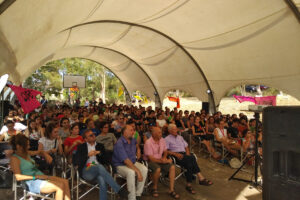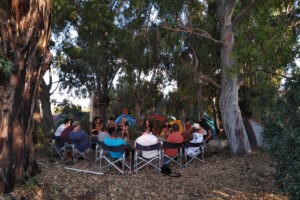OUR DIGITAL VILLAGE – Co-designed digital education in rural Areas
Programme: Erasmus + – KA2: Forward-looking projects
DESCRIPTION OF THE PROJECT
The rapid digital transformation of last years and the Covid-19 pandemic have highlighted the divergences linked to digitisation especially between urban and rural areas. The need to promote the acquisition of digital and transversal skills, preparing people living in rural areas to face the challenges of the future emerged all over EU. Our Digital Village aims at co-creating and testing high-quality educational contents that responds to the needs of the rural context, while simultaneously ensuring the long-term transformation towards digitalization through active awareness raising on all levels of society. With the direct involvement of people from rural communities as well as political actors, the project promotes a bottom-up participation approach that can bring a long-lasting impact on education and rural communities.
The specific objectives of the project are:
- To initiate a self-analysis process in rural areas through the democratic and participatory “Reciprocal Maieutic Approach” in order to identify context-specific needs, increase motivation and raise awareness about the potential of digital and transversal competences necessary for the current and future labour market, education and social life.
- To create educational materials through a co-design process, aiming to strengthen the digital and transversal skills of teachers, trainers and learners, while developing dedicated tools to evaluate and monitor its quality and transferability.
- To test and evaluate the Our Digital Village Activity Kit with teachers and trainers during training activities and implementation of ICT courses in educational institutions in rural areas, while fostering the digital and transversal kills development of school and adult learners.
- To contribute to a sustainable process of digital transformation in rural areas and to mainstream the project’s approach in order to have a positive European impact on educational and training systems.
ACTIVITIES
- International training for project staff trainers on the RMA method to build their capacity in the self-analysis approach and RMA method .
- Self-analysis workshops cycle of 9 sessions with 3 different groups in each implementing country.
- International training for ICT experts on the creation of ICT challenges to teach digital and key skills.
- Training for ICT and pedagogical skills for teachers/trainers in each country on how to use the Our Digital Village Activity Kit and the technologies it describes.
- ICT courses in each country with young/adult learners, testing the Our Digital Village Activity Kit activities.
- Co-evaluation meetings in each country with teachers, trainers, learners and policy makers/stakeholders to
- evaluate the impact of the Our Digital Village Activity Kit and approach.
- Info sessions in each country on the opportunities offered by the acquisition of digital skills in life and work.
- Local community events in each country showcasing the final projects made by participants of the ICT courses.
- Workshops for education and training institutions, public authorities and other stakeholders on applying for local/national/EU funding to continue the project’s activities after its lifetime.
- Online workshops for stakeholders and policy makers in the ALDA network.
- International online Digital Summit to foster the exchange of local policy makers and stakeholders who participated in the project.
- Final conference in Brussels to reach EU-level policy makers and stakeholders.
PARTNERS
- Coordinator: Centro per lo Sviluppo Creativo Danilo Dolci, Italy
- Fablab, Italy
- die Berater, Austria
- KMOP – SOCIAL ACTION & INNOVATION CENTRE, Greece
- Danmar Computers, Poland
- CSI – Center for Social Innovation, Cyprus
- ACDC, Romania
- Inova+, Portugal
- Universidad de Alicante, Spain
- ALDA, France


